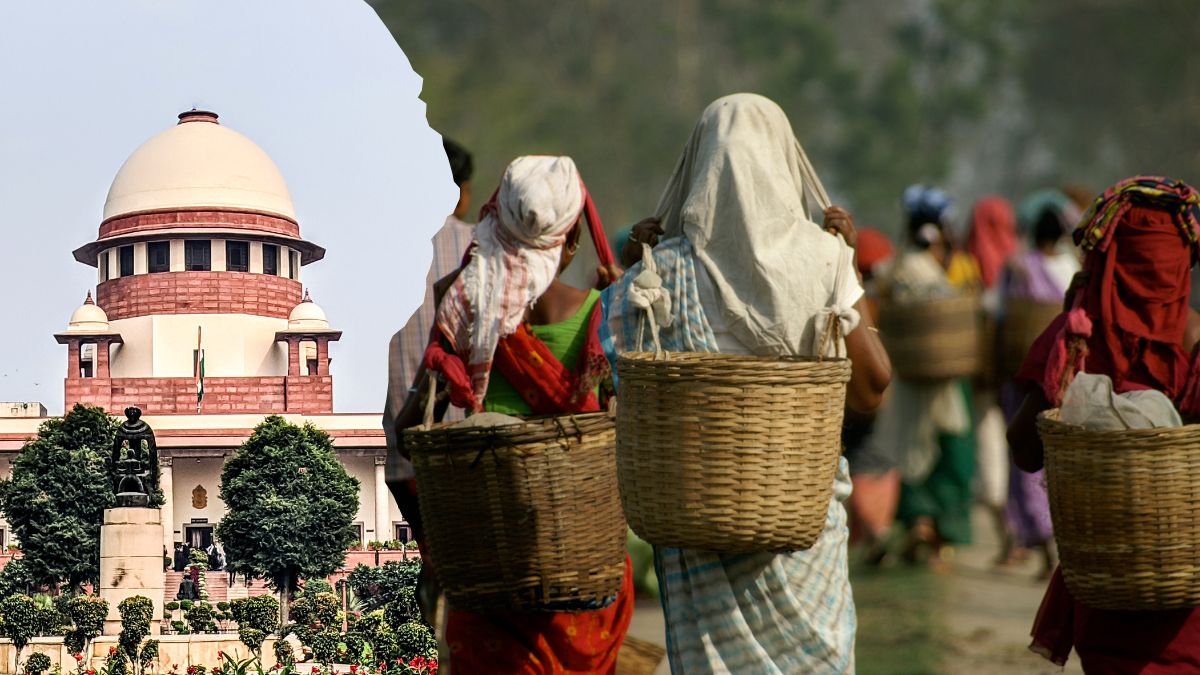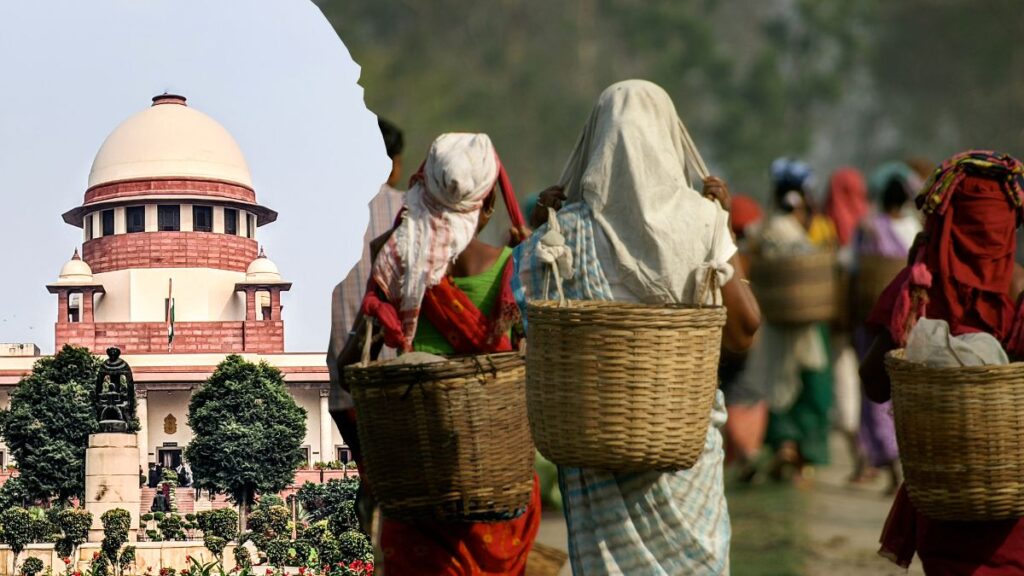
Supreme Court orders payment of Rs.650 crores to workers of 25 Tea gardens in Assam

Supreme Court orders payment of Rs.650 crores to workers of 25 Tea gardens in Assam
Supreme Court orders payment of Rs.650 crores to workers of 25 Tea gardens in Assam
On 7th Feb of 2023, the Hon’ble Supreme Court of India directed the payment of about Rs. 650 crores due towards 28,556 workers of 25 Tea gardens in the State of Assam, which includes 15 gardens owned by Assam Tea Company Ltd (ATCL), a PSU of Assam Govt.
A bench of Justices MR Shah and CT Ravikumar accepted the report submitted by the Rtrd. Justice AM Sapre concerning the State of Assam in the case seeking proper dues to the tea garden workers. Justice Sapre Committee was appointed by the Supreme Court via its order dated 10.01.2020 to ensure that the dues of tea garden workers are properly calculated and paid accordingly.
Sapre Committee concluded that Rs.414.7 crores (approx.) are the total amount of various dues payable to the 28,556 workers of 25 Tea gardens in the State of Assam and RS. 230.7 crores (approx.) is the total amount payable to the Provident Fund department.
The case in question arose out of a petition filed by the International Union of Food, Agricultural, Hotel, Restaurant, Catering, Tobacco and Allied Workers’ Associations (hereinafter referred to as “Union”) before the Supreme Court in 2006, wherein it was claimed that plantation owners owed huge amounts in pending wages, gratuity, and provident fund to tea workers and the Central Government had failed to take steps to recover the same from the plantation owners in terms of the provisions of the Tea Act, 1953.
In its Interim Order dated 30.04.2009, the Supreme Court had directed the concerned State Governments to ensure the provision of work under MNREGA / Anganwadi Scheme and to also ensure that if there was acute poverty, food was provided for free or at subsidized rates to the plantation workers.
On the failure on the part of State Governments in implementing the order, the Supreme Court subsequently in its order dated 06.08.2010 directed the Central Government to carry out their statutory duties under the provisions of the Tea Act, particularly, in terms of Sections 16B, 16C, 16D and 16E within six months from today.”These provisions of law grant the Government the power to investigate the situation of a tea undertaking/unit and to take over the same under certain conditions.
Unfortunately, the judgment was never complied with. Therefore, a contempt petition was filed for its violation by the Union in 2012, about which the Supreme Court, in its order dated 04.04.2018 found that “workmen, who worked for about 20 years have not been paid their wages. Their condition is pitiable and some of them have resorted to suicide.
In that respect, the Supreme Court directed that the necessary funds of Rs.99 crores would have to be given by the State of Assam for disbursement to retired employees. The Sapre Committee report stated that the State Govt. can now recover this amount from the ATCL.
A report published by Oxfam, IIT Bombay and Tata Institute of Social Sciences in 2019 titled ‘Addressing the Human Cost of Assam Tea’ has also flagged violations of labour rights in the tea estate of Assam e.g. extremely low wages, injustice for women, lack of basic facilities etc.
When COVID-19 hit India, the Assam Sangrami Chah Sramik Sangha (ASCSS) affiliated with AICCTU, with more than 25,000 tea garden worker members, filed an application before the Supreme Court seeking payment of lockdown wages. The ASCSS relied on the circular dated 02.04.2020 issued by the Government of Assam directing all the plantation owners to disburse wages and ration to the plantation workers during the period of lockdown. In the petition, it was stated that “The workers in tea gardens are in dire circumstances and are facing extreme poverty. The earlier reports from the tea gardens suggest many starvation deaths due to non-payment of wages. With the lockdown, this situation will further aggravate and may put many lives at stake.”
The matter then came up before the Supreme Court on 18.01.2021, and the Court directed that the Sapre Committee should go into the claims made in the petition and pass appropriate orders specifying the exact amount that is due to the workmen.
Subsequently, the Sapre Committee passed an Order dated 02.04.2022 in respect of the dues of tea estate workers in Assam. The Order reveals the huge pending amounts due to the workers. The Sapre Committee has been monitoring and ensuring the payments of pending amounts in instalments and noting balance dues. The workers are yet to be paid their dues, pending now for over 16 years.
Assam boasts over 10 lakh tea workers in the organised sector alone, working in about 850 big estates. The State of Assam produces roughly 55% of India’s tea, forming large portions of the domestic consumption and exports. However, the workers earn abysmal amounts, with even the minimum wage being placed at Rs.205 a day (after a recent hike in May 2021), which workers are not even paid by most tea estates.
The Oxfam report also found that tea plantation workers in Assam get less than a fourth of the proposed living wage of Rs.884. A living wage is a wage envisaged in Article 43 of the Constitution, which is the wage required to ensure a decent standard of life, dignity, and full enjoyment of leisure to workers. Often, there is a conceptual difference between the minimum wage and the living wage which is required for a dignified life. However, even with this glaring gap, even minimum wages have not been paid to the tea plantation workers of Assam.
Tea plantation workers, forming part of the most vulnerable sections of the society in Assam, have toiled for decades for the State to be able to play host to the best quality tea and tourism in its tea estates. Workers, who have built the state to its present economic stability, and form the backbone of the industrial output of the State, are being deprived of their fundamental right to live with dignity.
Looking at the various evidential reports and directions of the High Courts and Supreme Court, the acceptance and implementation of the Sapre Committee report in toto is a welcome step. Now it is obligatory on the part of the Central and State Govt. to smoothen the implementation of the recommendations of the Committee and to extend various facilities and benefits guaranteed under the various labour laws of the country to the plantation workers who are considered to be the most vulnerable among the working labour class.
As far as the reports about other Tea gardens are concerned in Kerala and Tamil Nadu, the matter will come up on March 20 of 2023.







